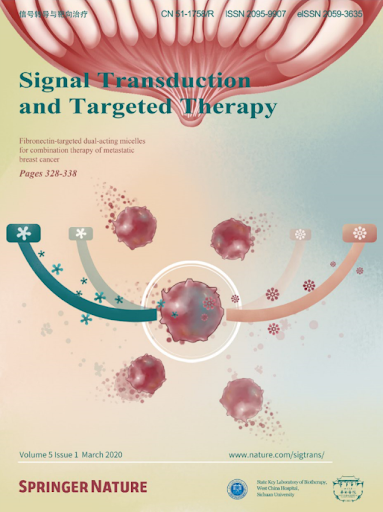DNA/ rna结合蛋白KIN17通过解决R-loop诱导的非规范STING激活支持食管癌进展。
IF 52.7
1区 医学
Q1 BIOCHEMISTRY & MOLECULAR BIOLOGY
引用次数: 0
摘要
靶向DNA损伤反应(DDR)在诱导免疫激活和改善患者预后方面显示出强有力的疗效。然而,由于某些癌症中复杂的代偿机制,DDR调节的益处并不是在所有患者中普遍观察到的。活化的DDR蛋白在食管鳞状细胞癌(ESCC)中的功能仍存在空白。本研究表明,DDR基因的表达增加有助于食管鳞状细胞癌的进展,并抑制肿瘤免疫微环境。值得注意的是,ESCC组织中大量存在的DDR蛋白KIN有助于有效清除DNA损伤并促进细胞凋亡的逃逸。KIN的缺失显著抑制ESCC细胞的增殖并诱导DNA损伤积累。从机制上讲,KIN的功能是支持r环调节因子DHX9募集到r环位点,从而解决与r环相关的DNA损伤。有趣的是,KIN的缺失通过NFκB信号激活STING通路,这是由r环的积累诱导的,最终启动先天免疫反应。KIN的缺失改善了小鼠模型的免疫微环境和免疫治疗效果。总之,我们的研究结果确定KIN是一种新的r环结合蛋白,促进r环分解复合物的募集并抑制肿瘤固有先天免疫。本文章由计算机程序翻译,如有差异,请以英文原文为准。
DNA/RNA-binding protein KIN17 supports esophageal cancer progression via resolving noncanonical STING activation induced by R-loop.
Targeting the DNA damage response (DDR) exhibits potent efficacy in inducing immune activation and enhancing patient prognosis. However, the benefits of DDR regulation are not universally observed across all patients, owing to the intricate compensatory mechanisms operative in certain cancers. There still exists a gap in the function of activated DDR protein in esophageal squamous cell carcinoma (ESCC). Here, we demonstrate that increased expression of DDR genes contributes to the progression of esophageal squamous cell carcinoma and suppresses the tumor immune microenvironment. Notably, the abundant presence of the DDR protein KIN in ESCC tissues facilitates efficient DNA damage clearance and promotes escape from apoptosis. Depletion of KIN significantly inhibited proliferation and induced DNA damage accumulation in ESCC cells. Mechanistically, KIN functions to support the recruitment of the R-loop regulator DHX9 to R-loop sites, thereby addressing DNA damage associated R-loops. Intriguingly, the depletion of KIN activates the STING pathway via NFκB signaling, which is induced by the accumulation of R-loops, ultimately initiating an innate immune response. Depletion of KIN improved the immune microenvironment and the effect of immune therapy in mouse model. Collectively, our findings identify KIN as a novel R-loop binding protein that facilitates the recruitment of the R-loop resolution complex and suppresses tumor-intrinsic innate immunity.
求助全文
通过发布文献求助,成功后即可免费获取论文全文。
去求助
来源期刊

Signal Transduction and Targeted Therapy
Biochemistry, Genetics and Molecular Biology-Genetics
CiteScore
44.50
自引率
1.50%
发文量
384
审稿时长
5 weeks
期刊介绍:
Signal Transduction and Targeted Therapy is an open access journal that focuses on timely publication of cutting-edge discoveries and advancements in basic science and clinical research related to signal transduction and targeted therapy.
Scope: The journal covers research on major human diseases, including, but not limited to:
Cancer,Cardiovascular diseases,Autoimmune diseases,Nervous system diseases.
 求助内容:
求助内容: 应助结果提醒方式:
应助结果提醒方式:


